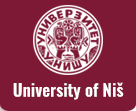Erasmus Mundus is a cooperation and mobility scheme in the area of higher education launched by the Europe Aid Cooperation Office in order to promote the European system of higher education and the European Union as a center of knowledge and excellence. The objectives of the Program are to promote the exchange of persons, knowledge and skills between the EU and third countries at a higher education level and to improve the quality of education. Partnership in education and research, as well as formation of a network of academic mobility, contributes to intercultural understanding and strengthening of the ties between the European Union and the Western Balkans.
The University of Niš has so far entered several mobility programs: BASILEUS, EM2-STEM, SIGMA, EUROWEB, ERAWEB, EUROWEB+, ERAWEB II, SIGMA Agile and GREEN-TECH.
Running programs
EUROWEB+ [http://www.mrtc.mdh.se/eurowebplus]
European Research and Educational Collaboration with Western Balkans
This international project within Erasmus Mundus programme- Acton 2, allows academic cooperation and mobilities in the field of Electronic Engineering and Information and Telecommunication Technologies. Students of all levels of studies can apply as well as teaching and administrative staff. The project lasts 4 years, and the participating universities are from 9 EU countries and 8 universities from the Western Balkans. EU partners in the project are the following universities: Mälardalen University, Project Coordinator (Sweden), Sofia University St. Kliment Ohridski (Bulgaria), University of L'Aquila (Italy), University of Paderborn (Germany), University Politehnica of Bucharest (Romania), the University of Westminster (UK), University of Amsterdam (Netherlands), Åbo Akademi University (Finland), Universitat de les Illes Balears (Spain).
Contact person: Prof. Dr. Dejan Milić ()
GREEN-TECH [http://green-tech-wb.uvigo.es]
This international project within Erasmus Mundus programme- Acton 2, allows academic cooperation and mobilities in the fields of: Information and Communication Technologies, Engineering and Power Engineering, Environmental Protection, Agriculture, Forestry, Mining, Business and Public Administration, Law and International Relations, Language Studies, Tourism and Cultural Heritage. Students of all levels of studies can apply as well as teaching and administrative staff. The participating universities are from 8 EU countries and 5 universities from the Western Balkans. EU partners in the project are the following universities: Universidade de Vigo, Spain (coordinator), the University of Porto, (Portugal), Universität Paderborn (Germany), University of Ljubljana (Slovenia), University of Economics in Katowice (Poland), University of Split (Croatia), University of Chemical Technology and Metallurgy, Sofia (Bulgaria), Universidad de León (Spain).
Contact person: Prof. Dr. Dejan Milić ()
ERAWEB II [http://erasmus-westernbalkans.eu]
This international project within Erasmus Mundus programme- Acton 2, allows academic cooperation and mobilities in the field of Medical sciences. Students of all levels of studies can apply as well as teaching and administrative staff. Five EU universities and six universities from the Western Balkan countries participate in this project. EU partners are the following universities: Erasmus University Medical Center Rotterdam, the project coordinator (the Netherlands), University of Turin (Italy), Universita Cattolica del Sacro Cuore (Italy), University for Health Sciences, Medical Informatics and Technology (Austria), Ludwig Maximilians -University Munich (Germany).
Contact person: Dr. Marko Jović ()
SIGMA Agile [http://www.sigma.uw.edu.pl]
Critical Skills Learning for Innovation, Sustainable Growth, Mobility and Employ Ability in the Multicultural Environment of the Western Balkans
This international project within Erasmus Mundus programme- Acton 2, allows academic cooperation and mobilities in almost all study fields. Students of all levels of studies can apply as well as teaching and administrative staff. The participating universities are from 9 EU countries and 11 universities from the Western Balkans. EU partners in the project are the following universities: University of Warsaw, Poland (coordinator); Humboldt University Berlin (Germany), Lappeenranta University of Technology (Finland), University of Milan (Italy), Pompeu Fabra University, Barcelona (Spain), University of Salzburg (Austria), University of Twente (The Netherlands), Universidade Nova de Lisboa (Portugal), City University London (UK).


